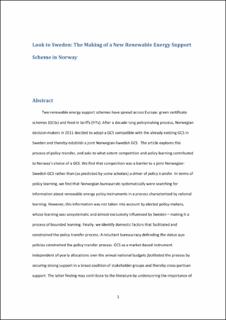| dc.contributor.author | Gullberg, Anne Therese | |
| dc.contributor.author | Bang, Guri | |
| dc.date.accessioned | 2021-05-06T12:21:26Z | |
| dc.date.available | 2021-05-06T12:21:26Z | |
| dc.date.created | 2014-04-25T09:13:34Z | |
| dc.date.issued | 2015 | |
| dc.identifier.citation | Scandinavian Political Studies. 2015, 38 (1), 95-114. | |
| dc.identifier.issn | 0080-6757 | |
| dc.identifier.uri | https://hdl.handle.net/11250/2753947 | |
| dc.description.abstract | Two renewable energy support schemes have spread across Europe: green certificate schemes (GCSs) and feed-in tariffs (FITs). After a decade-long policy-making process, Norwegian decision makers decided in 2011 to adopt a GCS compatible with the already existing one in Sweden and thereby establish a joint Norwegian-Swedish GCS. The article explores this process of policy transfer, and asks to what extent competition and policy learning contributed to Norway's choice of a GCS. It finds that competition was a barrier to a joint Norwegian-Swedish GCS rather than (as predicted by some scholars) a driver of policy transfer. In terms of policy learning, it finds that Norwegian bureaucrats systematically were searching for information about renewable energy policy instruments in a process characterised by rational learning. However, this information was not taken into account by elected policy makers, whose learning was unsystematic and almost exclusively influenced by Sweden – making it a process of bounded learning. Finally, domestic factors that facilitated and constrained the policy transfer process are identified in the article. A reluctant bureaucracy defending the status quo policies constrained the policy transfer process. GCS as a market-based instrument independent of yearly allocations over the annual national budgets facilitated the process by securing strong support in a broad coalition of stakeholder groups and thereby cross-partisan support. The latter finding may contribute to the literature by underscoring the importance of domestic political factors. | |
| dc.language.iso | eng | |
| dc.title | Look to Sweden: The making of a new renewable energy support scheme in Norway | |
| dc.type | Peer reviewed | |
| dc.type | Journal article | |
| dc.description.version | submittedVersion | |
| dc.source.pagenumber | 95-114 | |
| dc.source.volume | 38 | |
| dc.source.journal | Scandinavian Political Studies | |
| dc.source.issue | 1 | |
| dc.identifier.doi | 10.1111/1467-9477.12030 | |
| dc.identifier.cristin | 1129794 | |
| dc.relation.project | Norges forskningsråd: 199880 | |
| dc.relation.project | Norges forskningsråd: 209701 | |
| cristin.unitcode | 7475,0,0,0 | |
| cristin.unitname | CICERO Senter for klimaforskning | |
| cristin.ispublished | true | |
| cristin.fulltext | preprint | |
| cristin.qualitycode | 1 | |
